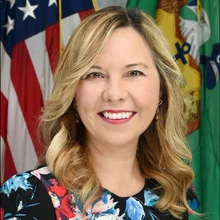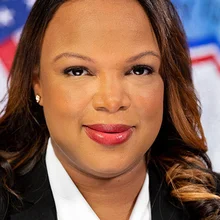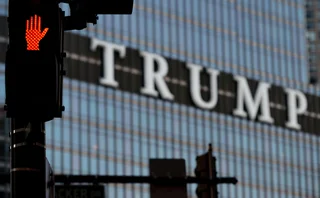
Go your own way: departures pose new challenges for CFTC
Loss of Democratic majority would impede chairman’s ambitions for regulatory agenda
Breaking up, as the song goes, is hard to do. And when the relationship in question is crucial for the smooth issuance of derivatives regulations, the estrangement is harder still.
This month, Risk.net examined the current state of the Commodity Futures Trading Commission and drew attention to what our sources – including 12 current and former officials and commissioners – described as an agency paralysed by a divided majority.
The divisions are between chairman Rostin Behnam and his fellow Democratic commissioners, Christy Goldsmith Romero and Kristin Johnson. The resulting frictions may help explain why the pace of rulemaking and routine business at the CFTC have slowed in recent years.
Last week, US President Joe Biden announced his intention to appoint the two dissenters to new positions: Goldsmith Romero as chair of the Federal Deposit Insurance Corporation (FDIC) and Johnson as assistant secretary for financial institutions at the Department of the Treasury.
However, it is not clear that suitably screened replacements are waiting in the wings to take over from them at the CFTC.
In March, Behnam set himself the goal of holding votes on all outstanding rule proposals. The developments of recent weeks therefore have the potential to create deadlock ahead of November’s general election. Republicans on the commission would have an effective veto over the chairman’s agenda if Goldsmith Romero and Johnson were confirmed in their new posts while their seats on the CFTC remained unfilled. If there were a 2-2 split on the committee, the chairman’s proposals would not be adopted.
Every now and then we fall apart
The best scenario for Behnam would be for Goldsmith Romero, Johnson and their replacements on the CFTC to be confirmed as a single package. That way, the new commissioners would be able to take over immediately and business could continue with a revitalised Democratic majority.
Yet it is by no means certain that the departing commissioners will be swiftly confirmed in their new roles. If their nominations are presented at a July hearing of the US Senate, proceedings would need to move quickly for them to be confirmed before the Democratic-controlled upper house goes into recess the following month.

Goldsmith Romero’s nomination is likely to be a priority for the Senate, given the urgent need to find a new FDIC chair. The current chair, Martin Gruenberg, announced his resignation last month after an independent investigation found he had presided over a toxic workplace culture.
However, Republican senators may wish to delay Goldsmith Romero’s confirmation. The chair of the FDIC is an important position and Republicans may be reluctant to confirm her appointment this close to the election, as she would continue in the role even if Donald Trump were elected president. In the past, Goldsmith Romero has taken a tough line on regulating banks – a sector Trump deregulated during his previous term.
Yet these same Republicans might have fewer qualms about expediting Johnson’s appointment – unlike the FDIC chair, she would be a political appointee, and a future President Trump could replace her if he wanted to. Her departure from the CFTC could cause deadlock on the commission until her replacement is seated.

If the CFTC’s built-in Democratic majority can be infused with new blood, this will aid the chairman’s cause. However, this supposes that CFTC nominees could be fast-tracked and their nominations synchronised with Goldsmith Romero and Johnson’s confirmations in their new roles. Commissioners are nominated by the president and confirmed by the Senate after undergoing rigorous vetting. September is likely to be the earliest time by which they could be in place. And if talks between Democrats and Republicans on the nominations stall, the replacement commissioners might have to wait until after the election before joining the CFTC.
Perhaps by making efforts to forge consensus on the commission, Behnam will be able to cut deals to avoid a stalemate on some remaining items. He is reputed to hold cordial relationships with the two Republican commissioners and is generally well-liked in the industry. But this may count for little when he wants to finalise contentious policies, such as those on carbon or crypto markets. Progress on such matters may be easier to achieve while Goldsmith Romero and Johnson are still in the building.
Meanwhile, efforts at diplomacy could take place over the summer to reach an accord with Republicans on voting through less vexing proposals in October.
It may be that Behnam and the two Democratic commissioners are never ever getting back together. But when it comes to his Republican colleagues, talking things through might be the best way forward.
Editing by Daniel Blackburn
Only users who have a paid subscription or are part of a corporate subscription are able to print or copy content.
To access these options, along with all other subscription benefits, please contact info@risk.net or view our subscription options here: http://subscriptions.risk.net/subscribe
You are currently unable to print this content. Please contact info@risk.net to find out more.
You are currently unable to copy this content. Please contact info@risk.net to find out more.
Copyright Infopro Digital Limited. All rights reserved.
As outlined in our terms and conditions, https://www.infopro-digital.com/terms-and-conditions/subscriptions/ (point 2.4), printing is limited to a single copy.
If you would like to purchase additional rights please email info@risk.net
Copyright Infopro Digital Limited. All rights reserved.
You may share this content using our article tools. As outlined in our terms and conditions, https://www.infopro-digital.com/terms-and-conditions/subscriptions/ (clause 2.4), an Authorised User may only make one copy of the materials for their own personal use. You must also comply with the restrictions in clause 2.5.
If you would like to purchase additional rights please email info@risk.net
More on Our take
Why did UK keep the pension fund clearing exemption?
Liquidity concerns, desire for higher returns and clearing capacity all possible reasons for going its own way
UBS’s Iabichino holds a mirror to bank funding risks
Framing funding management as an optimal control problem affords an alternative to proxy hedging
Trump 2.0 bank supervision: simpler but no soft touch?
Republican FDIC vice-chair Travis Hill wants more focus on financial risk instead of process
Lots to fear, including fear itself
Binary scenarios for key investment risks in this year’s Top 10 are worrying buy-siders
Podcast: Alexei Kondratyev on quantum computing
Imperial College London professor updates expectations for future tech
Quants mine gold for new market-making model
Novel approach to modelling cointegrated assets could be applied to FX and potentially even corporate bond pricing
Thin-skinned: are CCPs skimping on capital cover?
Growth of default funds calls into question clearers’ skin in the game
Quants dive into FX fixing windows debate
Longer fixing windows may benefit clients, but predicting how dealers will respond is tough








